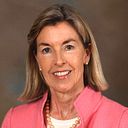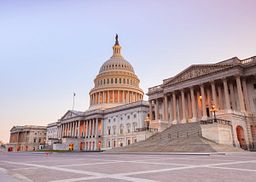GW PA Students Part of Front-Line Defense Against COVID

Having the chance to play a small – yet very important – role in history can help take the sting out of having to live through a pandemic. That was the opportunity that presented itself to students from the George Washington University PA program when Washington, DC, held its first high-capacity vaccination event earlier this month.
During the one-day event, more than 120 students, faculty, and staff from GWU’s academic clinical enterprise supported the government’s COVID-19 vaccine distribution efforts, vaccinating approximately 2,500 people with the new Johnson & Johnson vaccine.
Students were at the forefront of the event, offering their services in every phase of the vaccination experience – from checking in community members, to monitoring lines, assigning patients to stations, administering vaccines, educating patients, monitoring patients for adverse reactions, and checking them out.
“They were so excited to serve the community,” said Tami Ritsema, PhD, PA-C, interim chair of the GW Department of Physician Assistant Studies. “GW selects for students with a strong community service mindset, and many students felt like they had been missing that this year with all the social distancing limitations. They were thrilled not only to provide a community service, but also to be able to use their newly minted medical skills to do it.”
Clinical-year PA student Andrew Persaud had been helping Bread for the City administer free COVID-19 tests in the community for uninsured or underinsured individuals, so when he heard about the opportunity to take part in bringing life-saving vaccines to Washington, DC, he didn’t give a second thought to getting involved. “I feel like I gained a sense of fulfillment knowing that my classmates and I and our professors were being part of the solution to the pandemic.”
Luz Maria Kumpel, another clinical-year student, said that both the students who administered vaccines and the community members being vaccinated could feel the optimism in the room. “The tone of joy and hope was palpable,” she reflected. “Some patients in the vaccination chair had tears in their eyes, and I was thinking they might be afraid of getting the shot. But they said, ‘No, I’m just excited to be getting the vaccine.’ I got a little emotional seeing how this impacted people after what everyone has gone through over the past year. It was an honor to be part of that moment and event.”
The event was also meaningful in other ways for Persaud, who had the chance to work alongside many of his classmates and professors again after a year of virtual learning. “When the pandemic hit last March, everything became virtual,” he said. “This was the first time I had seen a lot of my classmates and professors in person in a year, so the face-to-face interaction felt great.”
Ritsema said the event also gave students the opportunity to try out their new patient education skills in real-time. “It was a chance to use their epidemiology background to explain the studies that went into getting vaccine approval to the patients, especially with patients who were scared or not entirely convinced that getting vaccinated was right for them,” she said. “At a large-scale event like this, there is no patient continuity, so you have no idea what the person sitting down with you will know or not know, will want or not want, and will understand or will not understand. Several students expressed great satisfaction when their patients told them ‘You are the first person who explained it all so clearly to me!’”
“This experience validated for me why I chose to become a PA,” said Kumpel. “To take care of members of my community and address the medical needs that arise for patients. It was a nice reminder of exactly why I chose this career path.”
Ritsema reflects on the monumental day – and her students’ passion and service – with considerable pride. “They were so excited to serve the community,” she said. “The students have seen a lot of suffering this year and participating in this event gave them some hope. It was incredibly satisfying for a group of students who started rotations in June 2020 to ‘fight back’ against COVID and meaningfully reduce the prevalence of the pandemic in Washington, DC.”
And with a new amendment to the PREP Act reducing the legal liability for PA students administering the vaccine, events like this will undoubtedly become more commonplace.










